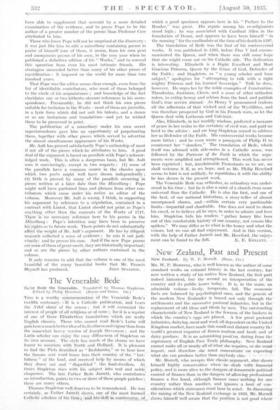The Venerable Bede
Sant Bede the Venerable. Translated by Thomas Stapleton, •
Tins is a worthy comincidoration of the Venerable Bede's twelfth centenary. lt is a Catholic publication, and bears the NW./ °fatal of the censor ; but it Will command the interest of people of all religions or of none ; for it is a reprint of one of those Elizabethan translations which arc really English classics. Those who cannot read Bedc's Latin will gain here a much better idea of its liveliness and vigour than from the 'somewhat heavy version of Joseph Stevenson ; and the Latin scholar can enjoy the easy diffusenest of Stapleton on its own account. The style has much of the charm we have learnt to associate with North and Holland. It is pleasant to find the Picts described as " Redshanks," or to hear how, the Saxons sent word home into their country of the " bat;. fulness " of the land, and received help by means of which they drove out and " disperkled.", thei land-dwellers. At times Stapleton rises with his subject into real and noble eloquence. The late Father Bede Jarrett, who contributes an introduction, points to two or three of these purple patches : there arc many others.
Thomas Stapleton well deserves to be remembered. He was certainly, as rather Jarrett shows, one of the most learned
Catholic seholars of his timeri• :and•Ilisskill :contmersori,of:
which a good specimen appears, here in his " Preface to the Reader," . was great. His ,repute among his co-religionists stood high ; he was associated with Cardinal Allen in the foundation of Douai, and appears to have been himself " in the running " for the tardinalate.at the time of his death in 1597. The translation of Bede was the first of his controversial works. It was published in 1565, before Pius V had excona- namicated the Queen, and when there was still some hope that she might come out on the Catholic side. The dedication is. interesting. Elizabeth is a Right Excellent and Most Gracious Princess, Queen by the Grace of God, Defender of the Faith ; and Stapleton, as " a young scholar and basic subject," apologises for " attempting to talk with a right mighty Princess and his learned Sovereign." Talk he does; however. He urges her by the noble examples of Constantine,. Theodosius, Justinian, Clovis, and a score of other orthodox rulers, to extirp heresy and schism from the land, and publish God's true service abroad.' As Henry V pronounced traitors all the adherents of that wicked sect of the Wyeliffites, and was therefore prospered by God in his French wars, so let the Queen deal with Lutheran and Calvinist.
Alas; Elizabeth, in her worldly wisdom, preferred a 'measure of peace in her realm to the certainty of civil war, and paid:no heed to the advice': and ere long Stapleton ceased to address her as Defender of the Faith. His controversial works became more bitter ; and he even wrote a panegyric of Philip H to counteract her " slanders." The translation of Bede, which itself was adorned with side-notes in a Catholic sense, was followed by the Fortresse of the Faith in which the argu- ments were amplified and strengthened. This work has never been reprinted ; but, irreclaimable Protestants as we are, we shall welcome it if, as we hope, and as Mr. Philip Hereford seems to hint is not unlikely, he republishes it with the ability he has shown in the present work. , .
The Venerable Bede was orthodox, as orthodoxy.was under- stood in his time ; but he is also a saint of a church c's'en more universal than the Catholic. He is also the first, and one of the best, of our national historians, a story-teller of almost unsurpassed charm, and—within certain very pardonable limits—impartial: and charitable. One does not need to share his creed, or to believe all he says, in order to admire and love him. Stapleton bids his readers " gather honey like • bees out of this comfortable history of our country, not venom like. spiders." We may. differ as to what is the honey and what the . venom, but we can all find .enjoyment. And in this version; with the help of. Father Jarrett and Mr. Hereford, the enjoy,i


































 Previous page
Previous page